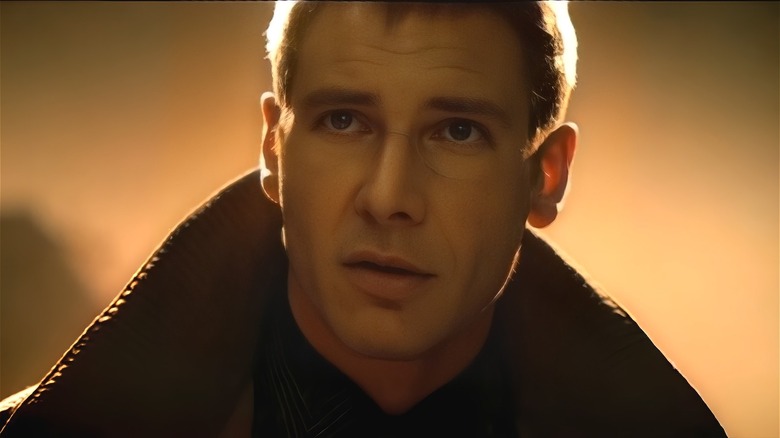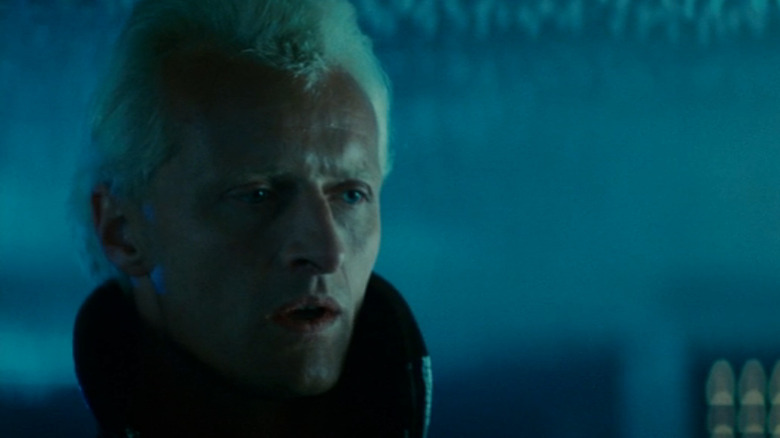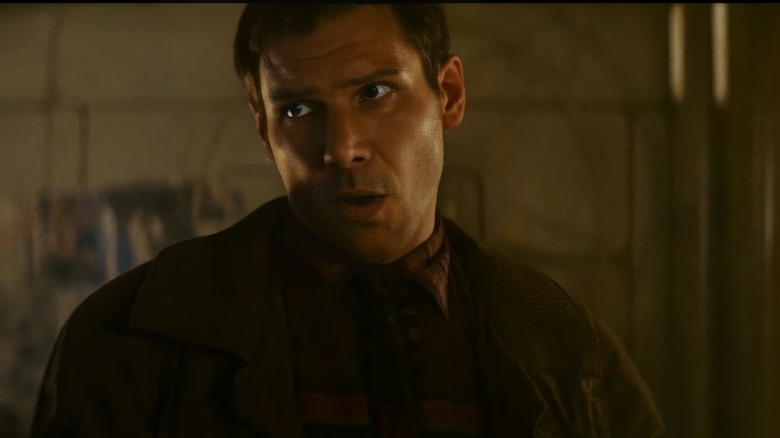What Is A 'Blade Runner' Anyway?
In the world of "Blade Runner," cybernetic beings called Replicants are used as cheap labor, but when they malfunction or go rogue, an elite group of police detectives known as Blade Runners is assigned to hunt down and "retire" them — that is, to kill them. As many fans know, "Blade Runner" was adapted from the Philip K. Dick novel "Do Androids Dream of Electric Sheep?" in which police officer Rick Deckard is tasked with hunting down renegade worker androids who have escaped to Earth from off-planet colonies. But the special task force assigned to hunt them does not call themselves Blade Runners in the novel.
Dick's book is far stranger than anything put to film in Ridley Scott's classic sci-fi thriller. Its version of the future is notably run-down, much like that of the movie, but its defining characteristic, aside from humanoid robots, is that almost all animals are extinct. The electric sheep referenced in the title is a robot sheep that its version of Deckard keeps as a pet. Part of Deckard's motivation in the book is his desire to acquire a real pet animal for his depressed wife.
However, Scott and his team felt that Dick's title was too clunky for a movie (as was the going trend with sci-fi pulp fiction of the 1960s, Dick's titles were often loquacious), so they searched elsewhere for inspiration, eventually stumbling upon a lesser known novel entitled "Blade Runner," which eventually stuck as the film's title.
Philip K. Dick didn't coin the term Blade Runner
When adapting Philip K. Dick's book into a feature film, director Ridley Scott ended up pulling its title from another speculative fiction novel, William S. Burroughs' "Blade Runner: A Movie." The book, published in 1979, is set in the far-flung future of 2009. The healthcare system has broken down, and renegade doctors must hire people to smuggle medical supplies for them. Those people, who traffic in scalpels and syringes, are called blade runners.
As reported by The Verge, Ridley Scott revealed the origin of his own movie's title in a 1982 interview, recalling that it had been suggested to him by screenwriter Hampton Fancher, who worked on the first drafts of the "Blade Runner" script. According to Scott, his team reached out to Burroughs, who granted permission to use the name.
But Burroughs himself had taken the name "Blade Runner," along with the premise of his book, from another book by the same name, this one by lesser-known author Alan E. Nourse. It, too, was set in a medical dystopia where "blade runners" smuggled medical supplies. But Burroughs, who had a keen interest in film, wrote the adaptation as a screenplay. Eventually, his version proved too costly to film, and so the project remained in text form alone.
The origin of the name Blade Runner runs three layers deep
The origin of Ridley Scott's title "Blade Runner" runs another layer deep. While Scott's screenwriter, Hampton Fancher, got the title from the novella "Blade Runner: A Movie" by William S. Burroughs, Burroughs himself wrote the novella as a spec script adaptation of an even older novel. That would be "The Bladerunner" by Alan E. Nourse. Published in 1974, it too followed a ring of underground medical equipment smugglers.
While none of the material from Nourse's novel made it into Ridley Scott's "Blade Runner," the book still went on to influence film history with more than its title. Parts of its medical dystopia are reflected in another well-regarded science fiction film, "Minority Report." And the primary source material for that movie is yet another Philip K. Dick novel, "The Minority Report."
That said, "Blade Runner" took nothing more than a title from the books of the same name. But part of the timelessness of Scott's film was in how thoroughly it disregarded all of its source material. Despite actually being an adaptation of "Do Androids Dream of Electric Sheep?" Scott carried over very little of Philip K. Dick's novel aside from the core premise of a police officer hunting down human-like androids.
Dick is among the most influential science fiction authors of all time, but his writing didn't translate well to screen. He was more concerned with taking a sci-fi premise and exploiting it to paranoid and psychedelic conclusions. In "The Minority Report," for example, we again find the seeds of the movie that adapted it, but without much of the character intrigue that makes the film so dynamic.
Ultimately, there's one clear reason why "Blade Runner" has been the title of so many projects. It simply sounds awesome.


